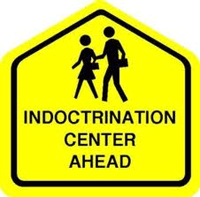 by Lucia Rafanelli –
by Lucia Rafanelli –
“Back to school” may soon mean something more like “back to political education camp” if liberal regulators have their way.
If your child is looking to get a high school diploma in Maryland, reading, writing, and arithmetic may no longer be enough. Students may soon have to be able to “[e]xplain that differences in the behavior of individuals arise from the interaction of culture and experience” in order to graduate.
Despite it sounding more like the stuff of sociology than hard environmental science, that line is taken from a draft of the state’s new “Environmental Literacy Curriculum.” The draft, according to William Reinhard of the Maryland State Department of Education, is meant to “help guide local [school] systems as they develop their own plans” to integrate environmental literacy into their curricula.
And this isn’t just some far-flung proposal destined to fail when put to a vote. Maryland’s Board of Education recently adopted a requirement mandating that high schools “embed broad environmental literacy standards into the pre-existing curriculum,” in Reinhard’s words.
In fact, not only did the board adopt it, but the vote was unanimous. And the bill — whose allies include the Audubon Society, Gov. Martin O’Malley, and former state school superintendent Nancy Grasmick — makes Maryland the first state to require “environmental literacy” for high school graduation.
According to Reinhard, the new regulation says each high school must include an “environmental literacy” program in its graduation requirements. While these programs are supposed to encourage students to “maintain optimal relationships” with the environment and preserve Maryland’s natural resources, “environmental literacy” itself is not very strictly defined, and — as shown by the curriculum excerpt above — its parameters may extend far beyond traditional environmental issues.
Although Reinhard stressed that the programs are locally designed by individual school systems, there is evidence that some supporters of the new rule hope it will set a precedent for national policy. For instance, Rep. John Sarbanes (D-MD), who thanked the board for passing its environmental literacy measure, also introduced the No Child Left Inside Act in the U.S. House. It would create a federal grant program for environmental literacy education.
And the Maryland No Child Left Inside Coalition, which announced it was “thrilled” with the board’s decision, is working to add environmental literacy provisions to the No Child Left Behind Act when it is reauthorized this year.
Although locally designed, each of the state’s environmental literacy programs must be approved by the state superintendent, who will evaluate it based on a set of standards, including whether it ensures that students “understand and value the interdependence between the environment and our health, economy, and culture” and that they “develop and apply knowledge and skills at the community level for cooperative action to protect and sustain the environment.”
Reinhard also claims that “the new regulation received broad support from both the [school] systems themselves and the general public.”
But it certainly has its critics.
J.B. Jennings, a Maryland State Senator and former member of the State House of Delegates Environmental Matters Committee, is one of them. He appeared on Fox News to discuss the implications of the environmental literacy requirement. Jennings worries that the new standards are just an excuse for liberal educators to indoctrinate their students, that they are simply another opportunity for public schools to teach impressionable children to adopt certain political views.
“What kind of education is it going to be?” Jennings asked. “Is it going to be fact-based? Or is it going to be theory-based, which is usually politically, theory driven?”
The above-mentioned curriculum draft doesn’t exactly dispel Jennings’ fears. One of its provisions even states that students shall “explain how groups and individuals can work to promote and balance interests through: Government policies…”
So the new guide for Maryland high schools suggests tax dollars should pay for teachers to tell kids how the government can solve their problems.
The guide also suggests the schools should convince students that we are on the brink of an environmental crisis, stating students shall “[i]nvestigate, analyze and explain how human impacts threaten current global stability and if not addressed, will irreversibly affect earth’s systems.”
Proponents of Maryland’s new requirement argue that environmental education boosts student performance by involving their local environments in a hands-on way that will motivate them to achieve.
But while the importance of hands-on experience and enthusiasm to academic success is widely accepted, there are plenty of ways to incorporate these things into public education without telling students what environmentally oriented laws to support and what political opinions to hold. Labs, for instance, or environmental education that is based in science rather than political ideology are excellent ways to get students to experience first-hand the subjects about which they learn.
Instead, Maryland has opted for a new mandate for its public schools, which will remove power from local high schools, giving the State Superintendent the authority to audit their curricula for adherence to environmental literacy standards (whatever they are), and possibly forcing them to limit other areas of education to make room for the environment.
As Jennings told Fox, “They can’t just keep adding on and on, so they will have to make room for this by pushing other things out of the curriculum…”
In fact, in a document published on the Maryland Department of Education website, John Franklin of the Association for Supervision and Curriculum Development concedes there is a conflict between time devoted to environmental literacy and time devoted to more traditional subjects, such as science and math. Franklin, alas, was arguing that the push to divert money toward math and science education is misguided.
With national math and science scores lagging and thousands of young minds vulnerable to school-driven political influence, the country should think carefully before following Maryland’s lead on environmental education.
HT: American Spectator (read full article)

